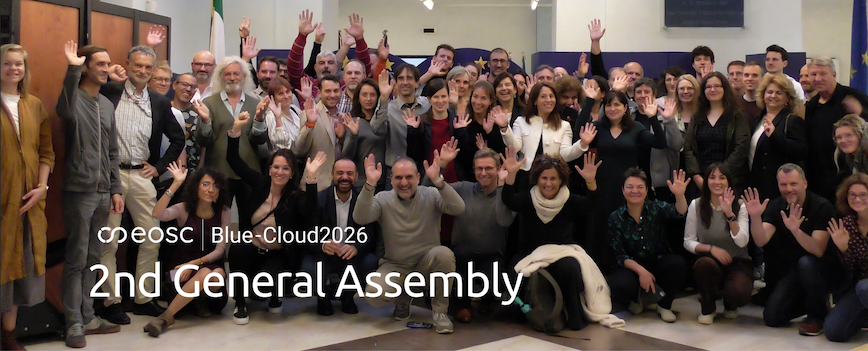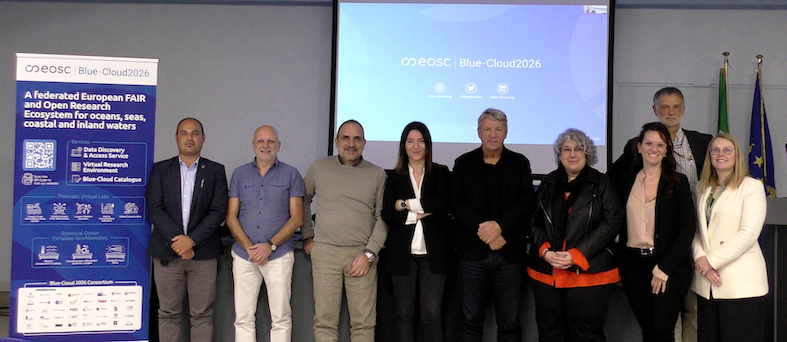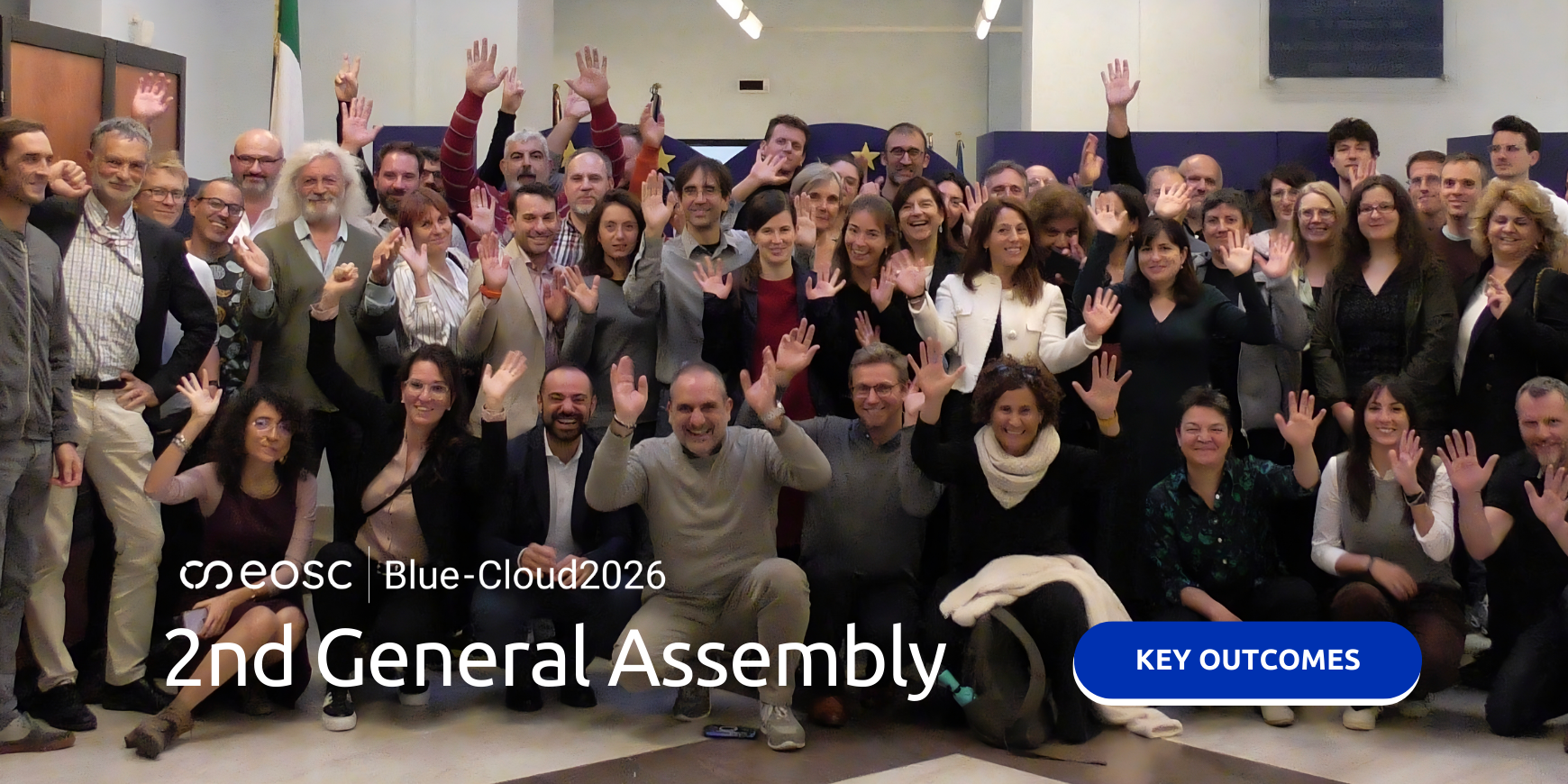Data collection, analysis & application are key enablers for Ocean data innovation. Integration is needed, open science is one of those transformative changes that the ocean needs. Research infrastructure are key elements to implement open science, they work as symbiotic ecosystems for effective implementation of open science. Research infrastructures provide data to different sectors of society, from coastal research to beach safety to sustainable fisheries to marine heatwaves, from carbon monitoring to citizen science applications. With input by EMODnet, Copernicus Marine and several leading marine Research Infrastructures (EurOBIS, Euro-Argo, ELIXIR-ENA, SOCAT, EcoTaxa, ICOS-Ocean, EMSO, SIOS, and ELIXIR-MGnify), the Horizon Europe Blue-Cloud initiative started its journey in 2019 with the aim to create a European Open Science Cloud for marine data by federating data and e-infrastructures and making data products and technologies available as open science resources for the broad marine research community. Since 2023, the Blue-Cloud 2026 follow-up project aims at a further evolution of this pilot ecosystem into a Federated European Ecosystem to deliver FAIR & Open data and analytical services, instrumental for deepening research of oceans, EU seas, coastal & inland waters.
From 7 to 9 November 2023 the 70+ representatives of the Blue-Cloud 2026 team gathered in Rome (Italy) for its 2nd General Assembly (GA) meeting, an opportunity for the consortium to discuss the work performed in the first year of the project and the upcoming activities.
On the 7th of December working meetings took place to discuss progress in the data-intensive Workbenches for selected Essential Ocean Variables (EOVs) that the project is developing (WP3, led by IFREMER), the exploitation opportunities for the scientific results of the project, namely the Virtual Laboratories and their data products, and the EOV workbenches, and the upcoming plans for the Blue-Cloud Training Academy.
The plenary meeting started on the 8th and was opened by Sara Pittonet Gaiarin, Trust-IT Services, Pasquale Pagano, CNR-ISTI, and Dick Schaap, MARIS, Project coordinator, Scientific coordinator and Technical coordinators of the project respectively.

Blue-Cloud Open Science Platform
The current Blue-Cloud technical framework is extensible and open by design, constantly evolving according to the needs of the community, facilitating collaborative research and the uptake of Open Science principles, through a distinguished set of marine data services. The status of development of those services was at the core of different sessions during the GA:
- Data Discovery & Access Service (DD&AS): An easy and FAIR service for discovering and retrieving multi-disciplinary data sets and products managed and provided by Blue Data Infrastructures. The federation facilitates sharing of datasets as input for analytical and visualisation services and applications, that are hosted and further developed in the Blue-Cloud Virtual Research Environment.
- Virtual Research Environment (VRE): An Open Science platform for collaborative marine research, using a wide variety of datasets and analytical tools, complemented by generic services, such as sub-setting, pre-processing, harmonising, publishing and visualisation. The VRE hosts different Virtual Labs and is going to include thematic Workbenches, which users can access with existing credentials in EOSC, the European Open Science Cloud. Multi-disciplinary datasets retrieved from the Blue-Cloud DD&AS can be exploited in the VRE. All methods and services in the Catalogue are exchanged with the EOSC Portal Catalogue & Marketplace.
- Thematic Virtual Labs (VLabs): where researchers work closely together with the Blue-Cloud 2026 technical team to describe Virtual Lab workflows and technical requirements, in order to implement them in the Blue-Cloud VRE and further test its capabilities on specific topics. The following Vlabs are available: Carbon-Plankton Dynamics, Global Fisheries Atlas, Coastal currents from observations, Integration of coastal ocean observations along Europe, Plankton Genomics, Marine Environmental Indicators, Aquaculture Monitor, Fish, a matter of scales and Zoo and Phytoplankton EOV products.
- Workbenches for Essential Ocean Variables (EOVs): A seriesof data-intensive Workbenches for selected EOVs will be established where ocean and data scientists can implement efficient workflows that allow them to harmonise, validate and qualify large and diversein situ data sources, exploiting the blue analytical services available in the Blue-Cloud VRE. The following EOVs are available: Ecosystem-level EOVs, Eutrophication: chlorophyll, nutrients, oxygen and Physics: temperature & salinity.
Blue-Cloud core services for EOSC and the European digital ocean twin initiatives
Blue-Cloud is well positioned in the European Open Science Cloud ecosystem and it is considered the thematic EOSC for the marine domain. Ute Gunsenheimer, Secretary General of the EOSC Association, gave a presentation during the event and highlighted that the cooperation with EOSC is very strong (Blue-Cloud is considered one of the success stories of EOSC, together with ByCovid). The Blue-Cloud Service platform features a variety of services that can be used for undertaking world-class science via the European Open Science Cloud (EOSC) ecosystem and therefore it is important to make the Blue-Cloud products and services accessible also from the EOSC Marketplace, where 16 services are already published. The GA dedicated an entire session to the Blue-Cloud VRE platform evolution and integration with EOSC resources and services, moderated by Massimiliano Assante, CNR-ISTI.
Given the scope of Blue-Cloud, the project is strictly connected also to the Digital Twin of the Ocean programme of the European Commission. The Blue-Cloud outputs provide data and data service assets that are essential for European twins and inclusion of European marine environments into global twins. Work completed under Blue-Cloud on harmonisation of data discovery and retrieval services across its infrastructures bring key data sets to direct availability for the data lake of the European DTO and to feed European data sets into the global DITTO initiative. Ongoing work on improving data services, for example in the molecular biology area domain, will serve to add appropriate metadata structures, for discovery into global ocean twins. Provision by Blue-Cloud of input data into digital ocean twins will give continuity to the work of data gathering and harmonisation, while offering immediate value to stakeholders in the digital twin initiatives. Furthermore, the different demonstration projects and VREs created in Blue-Cloud, will be offered to the EU DTO - via the collaboration with the EDITO Infra and EDITO Model Lab projects - and its international dimension (DITTO) to be hosted locally to illustrate focused usage of each of the twins and to sustain important expert work ongoing by Blue-Cloud's demonstrator communities.
Aspects related to the contribution to marine open science and the DTO were discussed as part of the sessions dedicated to “Developing and testing analytical Blue Cloud workbenches for generating highly qualified EOV data collections” and to the Blue-Cloud Virtual Labs. The former is led by Dominique Obaton, iFREMER, and EOV workbench leaders Meike Vogt, ETH Zurich, leading he Ecosystem-level EOVs Workbench, Alessandra Giorgetti, OGS, leading the one on “Eutrophication: chlorophyll, nutrients, oxygen”, and Simona Simoncelli, INGV, leading the data collection on “Physics: temperature & salinity”, while the latter is coordinated by Patricia Cabrera, VLIZ, and task leaders Joao Vitorino, Instituto Hidrografico, Alexander Barth, University of Liege, Steven Pint, VLIZ, Francesco Palermo, CMCC, and Julien Barde, IRD.
Blue-Cloud cooperation with the EU DTO will take place with the establishment of a DTO Task Force coordinated by Mercator Ocean. Discussions are already ongoing and will be further explored during a dedicated workshop taking place in February 2024.
The GA also offered an opportunity to kick-start conversation on creating pathways towards exploitation of the Blue-Cloud 2026 Key Exploitable Results, as part of a workshop led by Julia Vera, Seascape Belgium, in collaboration with Patricia Cabrera, VLIZ, Dominique Obaton, iFREMER and all VLab and Workbenches leads, as outlined above. Contributions gathered during the GA from across the partnership will provide the base for the work to be undertaken throughout the project on exploitation and sustainability of Blue-Cloud’s efforts.
The technical challenges that need to be addressed to work on optimising metadata output, both in content and in use of vocabularies, facilitate semantic interoperability and deliver a common metadata profile were discussed on November the 9th during the Technical and Scientific Committee (TSC) meeting lead by Dick Schaap, MARIS, and Pasquale Pagano, CNR-ISTI. The TSC also brainstormed on interactions among the different work packages to ensure the delivery open access, interoperable solutions under the umbrella of the Blue-Cloud Virtual Research Environment.
Outreach, training and synergies
Blue-Cloud2026 introduced a training academy, a novelty of the second phase of Blue-Cloud which aims to develop lessons and materials that guide people in utilising the Blue-Cloud services, in collaboration with IEEE, EuroGOOS, IODE, and OTGA from UNESCO. The training academy endeavors to create a collaborative platform for researchers and scholars through a series of webinars, workshops, and training sessions. The Task Leader of the training academy, Deniz Karaca presented the results of the first webinar organised on 26 September 2023 and emphasized the importance of fostering the uptake of open science practices and FAIR data principles within the marine domain. The webinar delved into the challenges and solutions associated with applying the FAIR foundational components. Specifically, the focus was on the journey from FAIR Principles to FAIR Practices, aiming to achieve FAIRification. The event provided valuable insights into the practical aspects of implementing FAIR data principles, best practices, and standards, shedding light on real-world challenges and adopting effective solutions in open science. The webinar gathered remarkable global participation, with more than 200 attendees joining from various parts of the world. This international engagement highlights the training academy’s effectiveness in reaching and engaging diverse audience interested in advancing open science practices and FAIR data principles.
The GA also offered the opportunity to discuss the synergies programme and the concrete actions that it is bringing forward with other data infrastructure and EU funded projects such as AquaINFRA (Blue-Cloud sister project), or FAIR-EASE, and the opportunities of creating synergies outside Europe, thanks to the support of UNESCO, IODE or JAMSTEC.
A strategic cooperation with the ESEB
Blue-Cloud 2026 is supported by an External Stakeholders Expert Board (ESEB) for high level guidance on strategy and policy and leverage of their relevant cross-sectoral networks. The ESEB members were invited to follow the General Assembly and to provide their feedback and recommendations. Marco Filippone, Fugro, Luciano Gaido, INFN, Sara Garavelli, CSC and EOSC Association, Elisa Ravagnan, NORCE, Marc Taconet, FAO joined the event in person, while Othman Cherkaoui Dekkaki, All-Atlantic Ocean Research Alliance and Early Career Ocean Professionals Africa, Hernan Garcia, NOAA and Toste Tanhua, EuroSea, followed the event remotely and joined the closed session on the 8th do December moderated by the ESEB Chair Kate Larkin, SSBE and EMODnet Secretary General, together with Blue-Cloud 2026 coordination team Sara Pittonet, Dick Schaap and Pasquale Pagano. The experts highlighted the importance of continuing to cooperate with EOSC and the EU DTO. The ESEB also discussed the added value of Blue-Cloud’s work on Data Federation and its potential linked to the building upon the data and metadata capability from SeaDataNet, EMODnet and other data infrastructures. They also recommended considering the exploitation in a broad sense, pushing for uptake of Blue-Cloud instances, tools and best practices into communities even beyond Europe and working for knowledge creation and training.
A summary report was presented to the Plenary audience on 9 November and will be released as a dedicated report to the Blue-Cloud Steering board.

